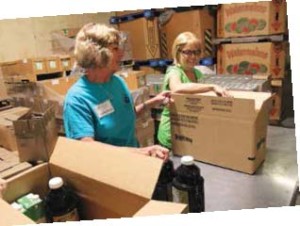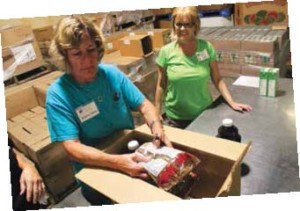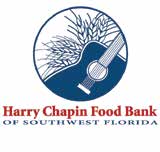Harry Chapin Food Bank – New program helps feed hungry seniors

Harry Chapin Food Bank volunteers Sophia Hesse (L, in blue) and Lisa Morrison (R, in green) pack boxes of food for seniors in need.
Each month, Estila and thousands of other Southwest Florida seniors confront a difficult choice:
Do they pay for their medicine and rent or do they buy food? More often than not, they sacrifice buying food to get by.
Estila, a Naples resident who lives on about $710 in monthly Social Security payments, is among the estimated 3,000 seniors the Harry Chapin Food Bank (HCFB) serves each month through a network of 150 partner agencies that operate food pantries and other feeding programs. “It’s a tremendous help,” Estila said of the fresh produce, meat and other food she received during one of the food bank’s mobile pantry distributions.
Nearly one in six – 9.6 million – seniors in the United States struggles with hunger. Senior hunger is an especially difficult issue to tackle because of the unique nutritional needs linked to aging and the medical conditions of older individuals.

Harry Chapin Food Bank volunteers Sharon Wilmoth (L, in purple) and Lynn Madore (R, in light gray) pack boxes of food for seniors in need.
Seniors are at increased risk for chronic health conditions including depression, heart attacks, asthma and congestive heart failure, according to Feeding America, the country’s leading anti-hunger organization and HCFB’s national affiliate.
“Senior hunger is a quiet but very real problem in our community,” HCFB President and CEO Al Brislain said. “Many seniors whose savings evaporated during the recession are still struggling to regain their financial footing while others have experienced a health crisis that’s left them with no money to pay their medical bills and other expenses, much less food.”
The Harry Chapin Food Bank is the only food bank in Florida to launch the Commodity Supplemental Food Program (CSFP). With a goal of enrolling 2,400 low-income residents ages 60 and older, HCFB provides these clients with a box of food each month until they no longer need the help. The boxes contain a variety of food including canned fruits and vegetables, juice, dry beans, rice, peanut butter and cereal. The U.S. Department of Agriculture provides the food through Florida’s Department of Agriculture and Consumer Services.

Harry Chapin Food Bank volunteer Sharon Wilmoth tapes a food box that will be given to a senior in need.
“This is the first time Florida applied to participate in this USDA program,” said Robin Safley, director, division of food nutrition and wellness, with the state’s agriculture department.
The program began in Collier County in the spring, and has expanded to Lee, Charlotte, Hendry and Glades counties. About 1,200 seniors were enrolled in the program by early July, and 618 of them are Collier County residents, said Kari Lefort, HCFB’s programs director.
“Coming out of the box with a new program, we wanted to make sure it was very successful,” Safley said. “The Harry Chapin Food Bank has been a phenomenal partner, and we rely on them to understand the needs of the community.”
Food bank volunteers pack the food boxes, which are then distributed by partner agencies to clients. The food bank is working with 13 organizations to get the food to clients.
Lefort said some clients are ashamed to ask for help at first, recounting a phone call she received from an older man. “He said that he received the informational flyer about CSFP over three weeks prior to calling me, but he was too embarrassed to admit that he needed additional support. He was in dire need, as his medications and other expenses have gone up, so he was having to choose between paying for his medications and paying for food. Being able to receive this monthly box would alleviate some of his burden.”
 What: Harry Chapin Food Bank of Southwest Florida an affiliate of Feeding America, solicits, collects and stores quality food for distribution to families and others in need through a network of 150 nonprofit agencies in Lee, Collier, Hendry, Charlotte and Glades counties that provide food to more than 30,000 people monthly. In 2014, the Harry Chapin Food Bank distributed 19.6 million pounds of food and other grocery items valued at more than $33.7 million.
What: Harry Chapin Food Bank of Southwest Florida an affiliate of Feeding America, solicits, collects and stores quality food for distribution to families and others in need through a network of 150 nonprofit agencies in Lee, Collier, Hendry, Charlotte and Glades counties that provide food to more than 30,000 people monthly. In 2014, the Harry Chapin Food Bank distributed 19.6 million pounds of food and other grocery items valued at more than $33.7 million.
This is roughly the equivalent of 16.3 million meals to people in need.
Where: 2221 Corporation Blvd. Naples, FL 34109; 3760 Fowler St. Fort Myers, FL 33901 Information: For general information, call 239.334.7007 or visit http://harrychapinfoodbank.org.
For information about the Commodity Supplemental Food Program, contact Programs Director Kari Lefort at 239.334.7007 x 124 or klefort@harrychapinfoodbank.org

Leave a Reply
Want to join the discussion?Feel free to contribute!